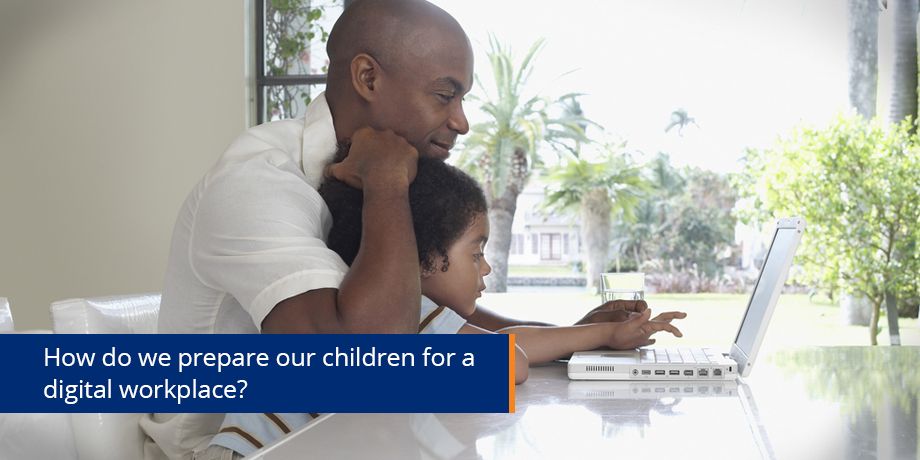
It’s intriguing to think about the kind of job opportunities our children are going to have, especially when it comes to preparing them for a career in a rapidly changing digital workplace.
- 65% of kids will end up with jobs that are yet to be created
- 85% of jobs in 2030 haven’t been invented yet
We are already witnessing how certain jobs are becoming obsolete. In a 2014 interview with the American Enterprise Institute, Bill Gates predicted that within just 20 years, software automation will be replacing jobs at a significant rate. Could your current role be replaced by a robot?
What kind of jobs can we expect in the future?
The answer to this question is: we just don’t know! But what we do know is that technology will continue to drive exponential change in the workplace.
Consider the growth in connectivity and information flow
2016
Annual global IP traffic was 1.2 zettabytes per year
2021
Annual global IP traffic will reach 3.3 zettabytes per year
A dose of perspective on Zettabytes
1 zettabyte = 1 billion terabytes = 1 trillion gigabytes = 703,687,443,750,000 web pages (with 1.6MB average page size). More info on Zettabytes here.
The Digital Universe
The size of the digital universe will double every two years, with a 50-fold growth (at least) expected from 2010 to 2020.
The Data “Big Bang”
Human- and machine-generated data is experiencing an overall 10x faster growth rate than traditional business data, and machine data is increasing even more rapidly at 50x the growth rate.
Moore’s Law
This estimates that computing power doubles approximately every 18 months.
There are many questions for parents to mull over…
How do we ensure our children are ready? What tertiary education facility will adequately prepare them for such a world? How can we ensure our children understand and are aware of online data privacy?
Where can they be taught to prepare for roles that don’t yet exist, using technology that has not yet been invented, to solve problems that we don’t even know exist yet?
Vital Skill #1: Learning to learn
As parents and educators, we need to shift our mindset from facilitating learning, to developing learners.
Given the rate at which our digital universe is expanding, learning that occurs at school will grow less and less relevant as new skills, occupations and technologies emerge.
If we simply facilitate the process of learning, as soon as students leave the classroom, the value of what they have learnt immediately starts to decline. If they are unable to continue learning outside of the formal education system, they will not keep up.
To remain relevant in such a rapidly changing landscape, learning needs to become a way of life. Just like exercising our bodies helps us avoid those nasty ailments that come with being overweight and unfit, the same applies to our minds. We have to develop learners who are able to continue to absorb and adapt throughout their working life.
Let’s contextualize this with an example.
Old-school learning facilitation
Welcome to Economics 101 where you will learn about macroeconomics, microeconomics, and personal finance.
Teaching how to learn
Welcome to Economics 101 where you will learn how to learn about economics. We’ll start with several economic topics I’ve selected in advance (macroeconomics, microeconomics, and personal finance), not just so you will get to know about them, but so that you will also have the opportunity to practice learning them and reflect on the process – this is so you can learn how to learn ‘yet-to-be-determined’ economic topics that will be important in the future.
Vital Skill #2: Collaborating
Artificial intelligence and machine learning are spurring the production of robots that are smarter and faster than humans. These machines are capable of sifting through zettabytes of data to ‘make decisions’. This could easily be seen as a threat to humans, but a collaboration is a great opportunity to blast through previous boundaries.
An example is IBM’s AI platform, Watson, which has been hard at work over several years, ‘learning’ about oncology treatment through its ability to ingest big data, and process it with machine learning and predictive modelling technologies. Watson for Oncology has been ingesting massive amounts of cancer related data – from doctors notes, to medical studies and clinical guidelines. It then runs millions of algorithms and ultimately recommends treatment – it does this within seconds. IBM executives admit there is a long way to go in perfecting this degree of AI, but they are still confident that the system will soon offer guidance to doctors about treatment for 12 cancers that account for 80 percent of the world’s cases. This will save doctors time and ensure that patients get top-quality care.
When one considers that health care data is growing at a reported rate of 48% annually, it makes sense that a collaboration between humans and AI will produce exponentially better results than either in isolation.
What do we do now?
Solitary work is not a concept that will flourish in the future workplace. We need to teach our kids to leverage machines and peers to reach the best decisions and produce the best results.
The reality is, we cannot predict the future in a way that gives our kids career certainty. But if we equip them to learn and collaborate, we don’t need to be concerned whether their education will be obsolete, nor if the onslaught of AI and robotics will limit their job opportunities.















